孟子与荀子英文版
- 格式:ppt
- 大小:444.50 KB
- 文档页数:38
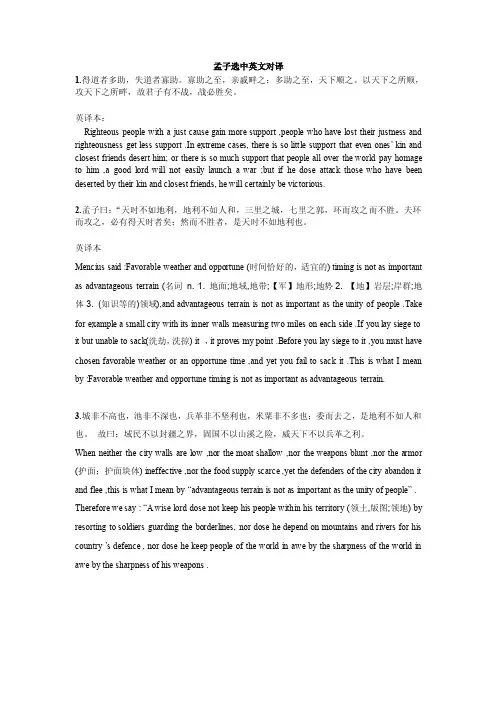
孟子选中英文对译1.得道者多助,失道者寡助。
寡助之至,亲戚畔之;多助之至,天下顺之。
以天下之所顺,攻天下之所畔,故君子有不战,战必胜矣。
英译本:Righteous people with a just cause gain more support ,people who have lost their justness and righteousness get less support .In extreme cases, there is so little support that even ones’ kin and closest friends desert him; or there is so much support that people all over the world pay homage to him ,a good lord will not easily launch a war ;but if he dose attack those who have been deserted by their kin and closest friends, he will certainly be victorious.2.孟子曰:“天时不如地利,地利不如人和,三里之城,七里之郭,环而攻之而不胜。
夫环而攻之,必有得天时者矣;然而不胜者,是天时不如地利也。
英译本Mencius said :Favorable weather and opportune (时间恰好的,适宜的) timing is not as important as advantageous terrain (名词n. 1.地面;地域,地带;【军】地形;地势2.【地】岩层;岸群;地体3.(知识等的)领域),and advantageous terrain is not as important as the unity of people .Take for example a small city with its inner walls measuring two miles on each side .If you lay siege to it but unable to sack(洗劫,洗掠) it ,it proves my point .Before you lay siege to it ,you must have chosen favorable weather or an opportune time ,and yet you fail to sack it .This is what I mean by :Favorable weather and opportune timing is not as important as advantageous terrain.3.城非不高也,池非不深也,兵革非不坚利也,米粟非不多也;委而去之,是地利不如人和也。

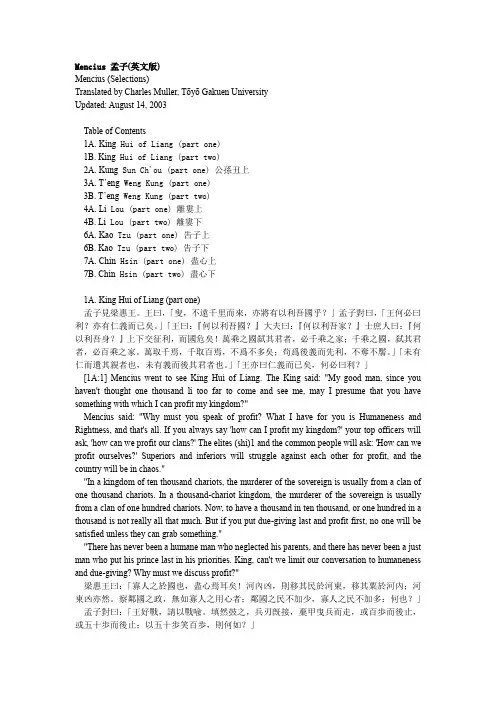
Mencius 孟子(英文版)Mencius (Selections)Translated by Charles Muller, Tōyō Gakuen UniversityUpdated: August 14, 2003Table of Contents1A. King Hui of Liang (part one)1B. King Hui of Liang (part two)2A. Kung Sun Ch'ou (part one) 公孫丑上3A. T’e ng Weng Kung (part one)3B. T’eng Weng Kung (part two)4A. Li Lou (part one) 離婁上4B. Li Lou (part two) 離婁下6A. Kao Tzu (part one) 吿子上6B. Kao Tzu (part two) 吿子下7A. Chin Hsin (part one) 盡心上7B. Chin Hsin (part two) 盡心下1A. King Hui of Liang (part one)孟子見梁惠王。
王曰,「叟,不遠千里而來,亦將有以利吾國乎?」孟子對曰,「王何必曰利?亦有仁義而已矣。
」「王曰:『何以利吾國?』大夫曰:『何以利吾家?』士庶人曰:『何以利吾身?』上下交征利,而國危矣!萬乘之國弑其君者,必千乘之家;千乘之國,弑其君者,必百乘之家。
萬取千焉,千取百焉,不爲不多矣;苟爲後義而先利,不奪不饜。
」「未有仁而遺其親者也,未有義而後其君者也。
」「王亦曰仁義而已矣,何必曰利?」[1A:1] Mencius went to see King Hui of Liang. The King said: "My good man, since you haven't thought one thousand li too far to come and see me, may I presume that you have something with which I can profit my kingdom?"Mencius said: "Why must you speak of profit? What I have for you is Humaneness and Rightness, and that's all. If you always say 'how can I profit my kingdom?' your top officers will ask, 'how can we profit our clans?' The elites (shi)1 and the common people will ask: 'How can we profit ourselves?' Superiors and inferiors will struggle against each other for profit, and the country will be in chaos.""In a kingdom of ten thousand chariots, the murderer of the sovereign is usually from a clan of one thousand chariots. In a thousand-chariot kingdom, the murderer of the sovereign is usually from a clan of one hundred chariots. Now, to have a thousand in ten thousand, or one hundred in a thousand is not really all that much. But if you put due-giving last and profit first, no one will be satisfied unless they can grab something.""There has never been a humane man who neglected his parents, and there has never been a just man who put his prince last in his priorities. King, can't we limit our conversation to humaneness and due-giving? Why must we discuss profit?"梁惠王曰:「寡人之於國也,盡心焉耳矣!河內凶,則移其民於河東,移其粟於河內;河東凶亦然。
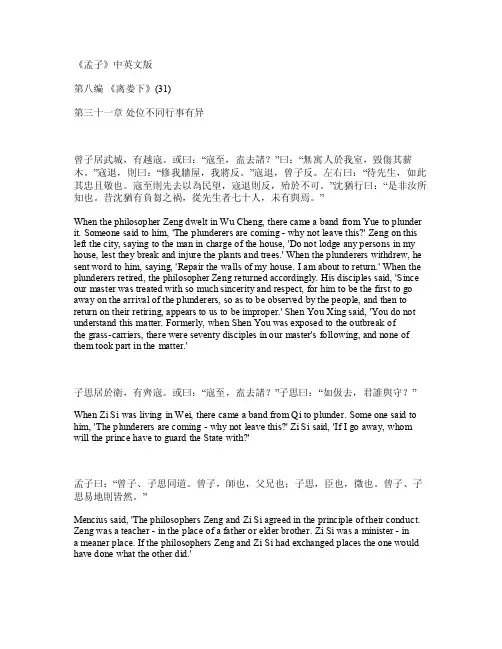
《孟子》中英文版第八编《离娄下》(31)第三十一章处位不同行事有异曾子居武城,有越寇。
或曰:“寇至,盍去諸?”曰:“無寓人於我室,毀傷其薪木。
”寇退,則曰:“修我牆屋,我將反。
”寇退,曾子反。
左右曰:“待先生,如此其忠且敬也。
寇至則先去以為民望,寇退則反,殆於不可。
”沈猶行曰:“是非汝所知也。
昔沈猶有負芻之禍,從先生者七十人,未有與焉。
”Whe n the phil osoph er Ze ng dw elt i n WuCheng, the re ca me abandfromYue t o plu nderit. S omeon e sai d tohim,'Theplund erers arecomin g - w hy no t lea ve th is?'Zengon th is le ft th e cit y, sa yingto th e man in c harge of t he ho use,'Do n ot lo dge a ny pe rsons in m y hou se, l est t hey b reakand i njure theplant s and tree s.' W hen t he pl under ers w ithdr ew, h e sen t wor d tohim,sayin g, 'R epair thewalls of m y hou se. I am a boutto re turn.' Whe n the plun derer s ret ired, thephilo sophe r Zen g ret urned acco rding ly. H is di scipl es sa id, 'Since ourmaste r was trea ted w ith s o muc h sin cerit y and resp ect,for h im to be t he fi rst t o goawayon th e arr ivalof th e plu ndere rs, s o asto be obse rvedby th e peo ple,and t hen t oret urn o n the ir re tirin g, ap pears to u s tobe im prope r.' S hen Y ou Xi ng sa id, 'You d o not unde rstan d thi s mat ter.Forme rly,whenShenYou w as ex posed to t he ou tbrea k ofthe g rass-carri ers,there were seve nty d iscip les i n our mast er'sfollo wing, andnoneofth em to ok pa rt in thematte r.' 子思居於衛,有齊寇。
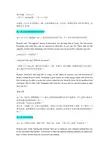
第十四编《尽心下》《尽心下- Jin Xin II》(共三十八章)本篇是《孟子》全书的最后一篇,内容仍然很丰富,其中有一些著名的章节和名言警句。
全篇原文共38章。
第一章仁者以其所爱及其所不爱孟子曰:“不仁哉梁惠王也!仁者以其所爱及其所不爱,不仁者以其所不爱及其所爱Mencius said, 'The opposite indeed of benevolent was the king Hui of Liang! The benevolent, beginning with what they care for, proceed to what they do not care for. Those who are the opposite of benevolent, beginning with what they do not care for, proceed to what they care for.'公孙丑问曰:“何谓也?”Gong Sun Chou said, 'What do you mean?'“梁惠王以土地之故,糜烂其民而战之,大败。
将复之,恐不能胜,故驱其所爱子弟以殉之,是之谓以其所不爱及其所爱也。
”Mencius answered, 'The king Hui of Liang, for the matter of territory, tore and destroyed his people, leading them to battle. Sustaining a great defeat, he would engage again, and afraid lest they should not be able to secure the victory, urged his son whom he loved till he sacrificed him with them. This is what I call "beginning with what they do not care for, and proceeding to what they care for."'【译文】孟子说:“很不仁爱啊梁惠王!仁爱的人把所喜爱的推及到所不喜爱的,不仁爱的人把所不喜爱的推及到所喜爱的上面。

《孟子·离娄上》中英对照
以下是《孟子·离娄上》的中英对照:
中文原文:
离娄之明,公输子之巧,不以规矩,不能成方圆;师旷之聪,不以六律,不能正五音;尧舜之道,不以仁政,不能平治天下。
今有仁心仁闻,而民不被其泽,不可法于后世者,不行先王之道也。
英文译文:
With the brightness of Li Lou and the skill of Gong Shu Zi, if there is no rule, we cannot create squares and circles. With the hearing of Shi Kuang, if there is no six-note scale, we cannot correct the five sounds. The way of Yao and Shun, if there is no benevolent governance, we cannot govern the world in peace. Nowadays, those who have benevolent hearts and reputations, but their people do not feel their benevolence and cannot be a model for future generations, are those who do not practice the way of the ancient sages.。
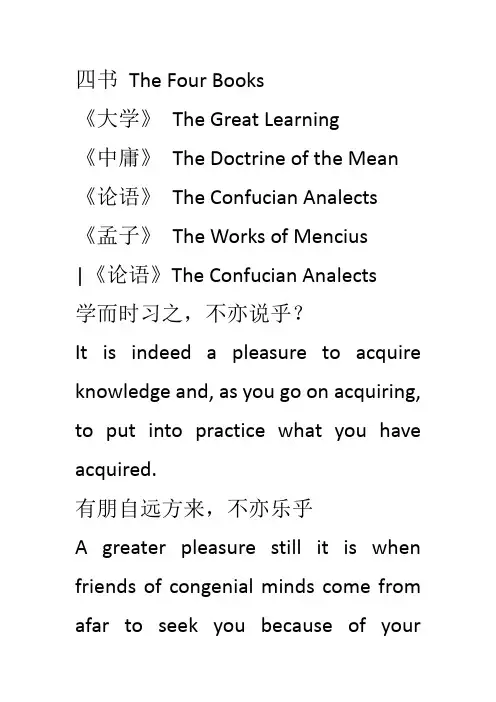
四书The Four Books《大学》The Great Learning《中庸》The Doctrine of the Mean 《论语》The Confucian Analects 《孟子》The Works of Mencius|《论语》The Confucian Analects学而时习之,不亦说乎?It is indeed a pleasure to acquire knowledge and, as you go on acquiring, to put into practice what you have acquired.有朋自远方来,不亦乐乎A greater pleasure still it is when friends of congenial minds come from afar to seek you because of yourattainments.温故而知新,可以为师矣。
If a man will constantly go over what he has acquired and keep continually adding to it new acquirements, he may become a teacher of men.学而不思则罔,思而不学则殆。
Study without thinking is labor lost. Thinking without study is perilous.君子周而不比,小人比而不周。
A wise man is impartial, not neutral. A fool is neutral but not impartial.知之为知之,不知为不知,是知也。
To know what it is that you know, and to know what it is that you do notknow, —that is understanding.辜鸿铭译|《孟子》The Works of Mencius故天将降大任于斯人也,必先苦其心志,劳其筋骨、饿其体肤,空乏其身,行拂乱其所为,所以动心忍性,曾益其所不能。
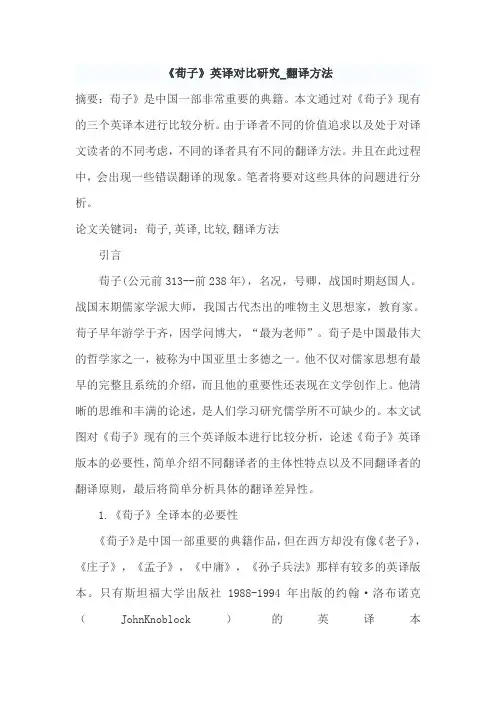
《荀子》英译对比研究_翻译方法摘要:荀子》是中国一部非常重要的典籍。
本文通过对《荀子》现有的三个英译本进行比较分析。
由于译者不同的价值追求以及处于对译文读者的不同考虑,不同的译者具有不同的翻译方法。
并且在此过程中,会出现一些错误翻译的现象。
笔者将要对这些具体的问题进行分析。
论文关键词:荀子,英译,比较,翻译方法引言荀子(公元前313--前238年),名况,号卿,战国时期赵国人。
战国末期儒家学派大师,我国古代杰出的唯物主义思想家,教育家。
荀子早年游学于齐,因学问博大,“最为老师”。
荀子是中国最伟大的哲学家之一,被称为中国亚里士多德之一。
他不仅对儒家思想有最早的完整且系统的介绍,而且他的重要性还表现在文学创作上。
他清晰的思维和丰满的论述,是人们学习研究儒学所不可缺少的。
本文试图对《荀子》现有的三个英译版本进行比较分析,论述《荀子》英译版本的必要性,简单介绍不同翻译者的主体性特点以及不同翻译者的翻译原则,最后将简单分析具体的翻译差异性。
1.《荀子》全译本的必要性《荀子》是中国一部重要的典籍作品,但在西方却没有像《老子》,《庄子》,《孟子》,《中庸》,《孙子兵法》那样有较多的英译版本。
只有斯坦福大学出版社1988-1994年出版的约翰·洛布诺克(JohnKnoblock)的英译本Xunzi:ATranslationandStudyoftheCompleteWorks,哥伦毕业大学出版社1963年出版的伯顿·沃森(BurtonWatson)的英译本HsünTzu:BasicWritings和,和伦敦:亚瑟·普罗赛因在1928年出版的德效骞(HomerHasenpflugDubs)的英译本TheWorksofHsünTze。
这三个译本在下面的文章里,将以洛译,沃译和德译来分别指代他们的翻译作品。
2.不同翻译家的主体性由于译者不同的价值追求以及处于对译文读者的不同考虑,不同的译者具有一定的主体性。
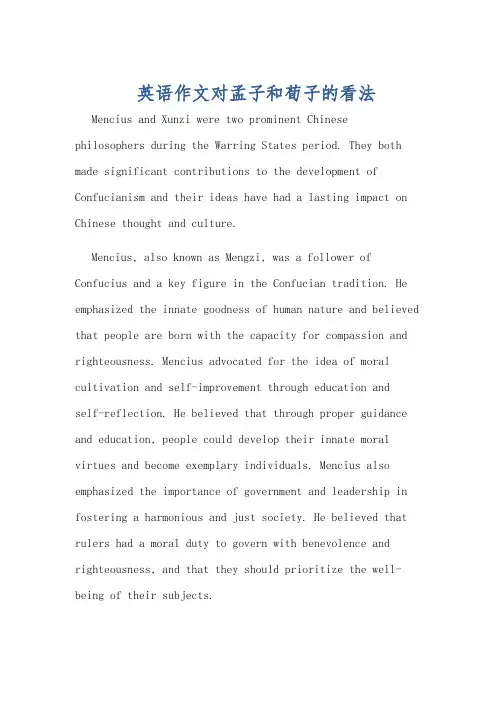
英语作文对孟子和荀子的看法Mencius and Xunzi were two prominent Chinese philosophers during the Warring States period. They both made significant contributions to the development of Confucianism and their ideas have had a lasting impact on Chinese thought and culture.Mencius, also known as Mengzi, was a follower of Confucius and a key figure in the Confucian tradition. He emphasized the innate goodness of human nature and believed that people are born with the capacity for compassion and righteousness. Mencius advocated for the idea of moral cultivation and self-improvement through education andself-reflection. He believed that through proper guidance and education, people could develop their innate moral virtues and become exemplary individuals. Mencius also emphasized the importance of government and leadership in fostering a harmonious and just society. He believed that rulers had a moral duty to govern with benevolence and righteousness, and that they should prioritize the well-being of their subjects.Xunzi, on the other hand, had a more pessimistic view of human nature. He believed that people were born withselfish and greedy tendencies and that it was only through proper education and socialization that they could be transformed into morally upright individuals. Xunzi emphasized the importance of rituals and traditions in shaping individual behavior and maintaining social order. He believed that a well-ordered society required strict adherence to rituals and moral principles, and that it was the responsibility of the government to enforce these standards. Xunzi also emphasized the role of self-cultivation and self-discipline in overcoming one's innate selfish desires and becoming a virtuous person.In comparing Mencius and Xunzi, it is evident that they had differing views on human nature and the ways in which individuals could achieve moral excellence. Mencius believed in the innate goodness of human nature and the potential for moral self-cultivation, while Xunzi had a more pessimistic view of human nature and emphasized the importance of external influences in shaping moral character.中文:孟子和荀子都是中国战国时期著名的哲学家。
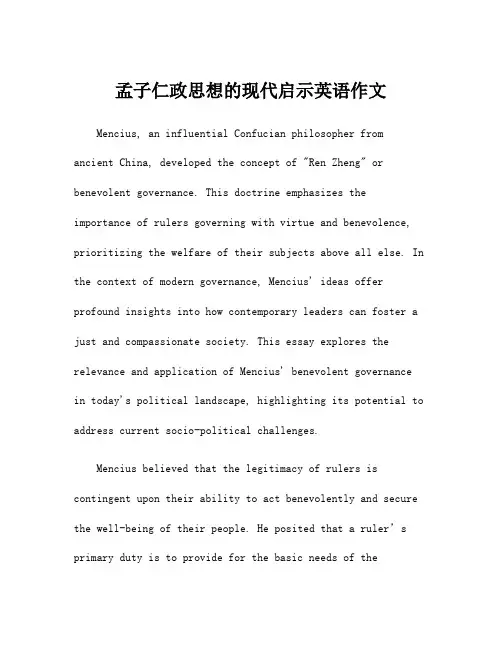
孟子仁政思想的现代启示英语作文Mencius, an influential Confucian philosopher from ancient China, developed the concept of "Ren Zheng" or benevolent governance. This doctrine emphasizes the importance of rulers governing with virtue and benevolence, prioritizing the welfare of their subjects above all else. In the context of modern governance, Mencius' ideas offer profound insights into how contemporary leaders can foster a just and compassionate society. This essay explores the relevance and application of Mencius' benevolent governancein today's political landscape, highlighting its potential to address current socio-political challenges.Mencius believed that the legitimacy of rulers is contingent upon their ability to act benevolently and secure the well-being of their people. He posi ted that a ruler’s primary duty is to provide for the basic needs of thepopulace, such as food, shelter, and security. In the modern era, this translates to ensuring economic stability, social security, and the protection of human rights. Governmentsthat adopt policies aimed at reducing poverty, improving healthcare, and ensuring equitable access to education embody the spirit of benevolent governance. By focusing on the welfare of citizens, modern leaders can cultivate publictrust and social harmony, which are essential for stable governance.One of the core principles of Mencius' benevolent governance is the idea that rulers must possess and exhibit moral virtues. He argued that rulers should be guided by principles such as compassion, integrity, and humility. In contemporary politics, this means that leaders should strive to be ethical and transparent, prioritizing the common good over personal gain or political expediency. The prevalence of corruption and political scandals in many countrieshighlights the urgent need for ethical leadership. Byadhering to high moral standards, leaders can set an example for society and build a culture of integrity and accountability.Mencius also emphasized the importance of education in cultivating virtuous leaders and citizens. He believed that education should not only impart knowledge but also foster moral development. In today’s world, this perspective underscores the need for educational systems that emphasize character education alongside academic achievement. Schools and universities should aim to develop well-rounded individuals who are not only knowledgeable but also empathetic, responsible, and committed to the public good. This holistic approach to education can produce future leaders who are equipped to govern benevolently and address complex societal issues.Another significant aspect of Mencius' philosophy is the concept of "Minben" or "people as the foundation." Menciusasserted that the people are the most crucial element of the state, and their welfare should be the ultimate goal of governance. This idea resonates with modern democratic principles, where the legitimacy of the government is derived from the consent and well-being of the governed. In democratic societies, this means that governments should actively engage with citizens, listen to their concerns, and involve them in decision-making processes. Public participation and inclusive governance are essential for ensuring that policies reflect the needs and aspirations of the people.In the context of global challenges such as climate change, Mencius' emphasis on benevolent governance is particularly relevant. Climate change poses a significant threat to the well-being of people worldwide, especially the most vulnerable populations. Governments that adopt Mencius' principles would prioritize sustainable development and environmental protection, recognizing that the health of theplanet is intrinsically linked to the welfare of humanity. By implementing policies that promote renewable energy, conservation, and environmental justice, leaders can address the root causes of climate change and ensure a sustainable future for all.Furthermore, Mencius’ ideas can inform international relations and global governance. He advocated for a just and humane approach to interactions between states, emphasizing mutual respect and cooperation. In the contemporary world, this perspective can guide diplomatic efforts and international collaborations. By fostering a spirit of benevolence and mutual benefit, countries can work together to address global issues such as poverty, conflict, and pandemics. International institutions and agreements that reflect these values can contribute to a more peaceful and equitable world order.The application of Mencius’ principles is not li mited to national governments. Local governments, businesses, andcivil society organizations can also draw inspiration from benevolent governance. For instance, local authorities can implement community-based programs that address specific needs, such as affordable housing, public health initiatives, and educational support. Businesses can adopt corporatesocial responsibility practices that benefit employees, consumers, and the broader community. Non-profit organizations can advocate for social justice and provide services that enhance the quality of life for marginalized groups. By embracing the ethos of benevolent governance, various sectors of society can contribute to a more just and compassionate world.Critics might argue that Mencius’ ideas are idea listic and difficult to implement in the complex realities of modern politics. However, the enduring relevance of his philosophy lies in its ability to inspire and guide. While achievingperfect benevolence in governance may be challenging,striving toward these ideals can lead to significant improvements in how societies are governed. Mencius' emphasis on virtue, the welfare of the people, and ethical leadership provides a valuable framework for addressing contemporary issues and fostering a more humane and equitable society.In conclusion, Mencius' concept of benevolent governance offers timeless wisdom that is highly applicable to modern governance. By prioritizing the welfare of the people, adhering to moral virtues, promoting education, and fostering public participation, contemporary leaders can create a just and compassionate society. Additionally, Mencius’ principles can inform international relations and inspire various sectors to contribute to the common good. While the challenges of implementing these ideas should not be underestimated, the pursuit of benevolent governance can lead to profound and positive changes in the modern world.。
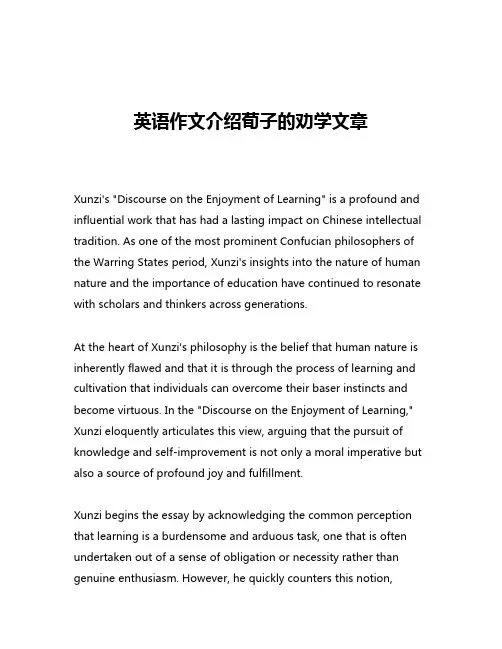
英语作文介绍荀子的劝学文章Xunzi's "Discourse on the Enjoyment of Learning" is a profound and influential work that has had a lasting impact on Chinese intellectual tradition. As one of the most prominent Confucian philosophers of the Warring States period, Xunzi's insights into the nature of human nature and the importance of education have continued to resonate with scholars and thinkers across generations.At the heart of Xunzi's philosophy is the belief that human nature is inherently flawed and that it is through the process of learning and cultivation that individuals can overcome their baser instincts and become virtuous. In the "Discourse on the Enjoyment of Learning," Xunzi eloquently articulates this view, arguing that the pursuit of knowledge and self-improvement is not only a moral imperative but also a source of profound joy and fulfillment.Xunzi begins the essay by acknowledging the common perception that learning is a burdensome and arduous task, one that is often undertaken out of a sense of obligation or necessity rather than genuine enthusiasm. However, he quickly counters this notion,asserting that true learning is not a chore but a profound and rewarding experience that can bring about profound personal transformation."The superior man delights in learning," Xunzi writes, "and the inferior man regards it as a burden." This distinction between the "superior man" and the "inferior man" is central to Xunzi's understanding of human nature and the role of education. For Xunzi, the superior man is one who has embraced the pursuit of knowledge and self-cultivation, and who has come to see learning as a source of joy and fulfillment.In contrast, the inferior man is one who views learning as a necessary evil, something to be endured rather than embraced. This individual, Xunzi argues, is ultimately doomed to a life of mediocrity and unfulfillment, for it is only through the process of learning and self-improvement that one can truly realize one's full potential as a human being.Xunzi's argument for the inherent value of learning is not merely abstract or philosophical but is grounded in a deep understanding of human psychology and the nature of personal growth. He recognizes that the pursuit of knowledge can be challenging and that it often requires individuals to confront their own limitations and biases. However, he also believes that it is precisely through this process ofconfrontation and self-examination that individuals can ultimately achieve a deeper understanding of themselves and the world around them.Moreover, Xunzi contends that the rewards of learning extend far beyond the individual, and that the cultivation of virtuous individuals is essential for the well-being of society as a whole. He argues that it is only through the cultivation of a learned and virtuous citizenry that a society can truly flourish and achieve lasting prosperity.Throughout the "Discourse on the Enjoyment of Learning," Xunzi offers a series of powerful metaphors and analogies to illustrate his point. He compares the process of learning to the cultivation of a garden, where the careful tending of one's intellectual and moral faculties can yield a bountiful harvest of wisdom and virtue. He also likens the pursuit of knowledge to the climbing of a steep and treacherous mountain, where the rewards of reaching the summit are all the more sweet for the challenges that must be overcome along the way.Ultimately, Xunzi's "Discourse on the Enjoyment of Learning" is a testament to the transformative power of education and the essential role that it plays in the cultivation of the individual and the well-being of society. Through his eloquent and persuasive arguments, Xunzi has inspired generations of scholars and thinkersto embrace the joys and challenges of learning, and to strive for a deeper understanding of themselves and the world around them.Whether one is a student seeking to cultivate their intellectual and moral faculties, or a leader seeking to build a more just and prosperous society, Xunzi's "Discourse on the Enjoyment of Learning" offers a powerful and enduring vision that continues to resonate with readers across cultures and time periods. It is a work that reminds us of the profound value of education and the essential role that it plays in the realization of our full potential as human beings.。
Confucius and MenciusConfucius and Mencius are two of the most outstanding and influential thinkers in Chinese history, and their thoughts have left a deep mark on Chinese culture and even the world.Confucius, known as Kong Qiu in Chinese, was born during a time of great turmoil in ancient China. He dedicated his life to education and traveling around various states to promote his ideas. He believed in the importance of moral cultivation. His teachings emphasized "Ren" (benevolence), which is the core value. For example, he taught that people should love others, respect their elders, and be kind - hearted. He also focused on "Li" (rituals). In his view, following proper rituals was a way to maintain social order. In daily life, we can see the influence of his thoughts. In a family, children are taught to respect their parents, just as Confucius advocated. In schools, the idea of respecting teachers and learning knowledge with an open mind also reflects his educational philosophy.Mencius, a successor of Confucian thought, further developed and expanded these ideas. He put forward the concept of "human nature is good." He believed that every person is born with the seeds of goodnessin their heart. For instance, when people see a child in danger, they will naturally feel the urge to help. This shows the good nature within them. Mencius also had strong political ideas. He thought that the ruler should rule with benevolence. If the ruler was cruel and unjust, the people had the right to overthrow him. His ideas were bold and had a profound impact on the understanding of governance and social structure.The thoughts of Confucius and Mencius have spread far and wide. They have not only influenced China for thousands of years, guiding people's moral concepts and social behaviors, but also attracted the attention of many Western scholars. Their ideas are like bright stars in the history of human thought, shining brightly and providing valuable spiritual wealth for generations to come.。
Xunzi,a prominent Chinese philosopher from the Warring States period,is well known for his significant contributions to Confucian thought.His teachings and writings have had a profound impact on Chinese philosophy and political theory.Here is an essay on Xunzi,highlighting his life,philosophy,and influence.Title:The Philosophy of Xunzi:A Pillar of ConfucianismIntroductionXunzi,born in313BC and passed away in238BC,was a philosopher who played a crucial role in shaping the Confucian tradition.His life was dedicated to the pursuit of knowledge and the refinement of moral character.This essay will delve into the life of Xunzi,explore his philosophical beliefs,and discuss his enduring influence on Chinese thought.Early Life and EducationXunzi was born in the state of Zhao during a time of political upheaval and intellectual diversity.He studied under various masters and eventually became a disciple of Confucius grandson,Zisi.His early education laid the foundation for his philosophical development,which would later challenge and enrich the Confucian tradition.Philosophical BeliefsXunzis philosophy diverged from the traditional Confucian emphasis on the innate goodness of humans.He believed that humans are inherently selfish and require education and ritual to cultivate virtue.His views on human nature,morality,and the role of the state are encapsulated in his major work,Xunzi.1.Human Nature:Xunzi argued that human nature is inherently inclined towards selfinterest and requires external guidance to develop moral qualities.2.Importance of Ritual:He emphasized the importance of ritual li in shaping behavior and maintaining social order.Rituals,according to Xunzi,are the means by which individuals learn to act virtuously.3.Role of the State:Xunzi believed in a strong,centralized government that could enforce laws and educate the people.He saw the state as a necessary institution to guide individuals towards moral behavior.cation:Xunzi placed great importance on education as a tool for moral development.He believed that through learning and the study of the classics,individuals could cultivate their virtues.Influence and LegacyXunzis ideas have had a lasting impact on Chinese philosophy and political thought.His emphasis on the role of education and the state in shaping human behavior has influenced the development of Chinese legalism and the Confucian emphasis on moral governance.1.Legalism:Xunzis ideas on the necessity of a strong state and the use of law to guide behavior were adopted by the Legalists,who believed in strict laws and harsh punishments to maintain order.2.NeoConfucianism:During the Song and Ming dynasties,Xunzis emphasis on ritual and the importance of education were integrated into the NeoConfucian movement, which sought to revive and reinterpret Confucian teachings.3.Modern Interpretations:In contemporary times,Xunzis ideas have been reinterpreted to address modern issues such as the role of education in society and the balance between individual rights and social responsibilities.ConclusionXunzis philosophy,with its emphasis on the importance of education,ritual,and the state in shaping human behavior,offers a unique perspective within the Confucian tradition. His belief in the malleability of human nature and the need for external guidance to cultivate virtue has had a profound impact on Chinese thought and continues to influence discussions on morality and governance today.。
《孟子》及其英译编者按:任何学术研究都离不开特定时代语境。
在多远文化、多级世界并存并且竞争日益激烈的当今,通过翻译来外宣中国传统文化,进而复兴中华文化,是我国所有翻译工作者不可推卸的历史使命,季红琴的文章就属此列。
同时,运用语料库推动翻译研究是另一种有效的研究方法,戈玲玲、王青与秦洪武、王家义的文章属于顺应这一趋势的阶段性成果。
提要:本文分两部分对《孟子》及其英译进行综述性总结。
第一部分集中阐述注疏;第二部分探讨几个世纪以来国内外《孟子》英译的情况以及各个时期较具影响的《孟子》英译本,并进行客观评述。
Mencius and Its Translation into EnglishJiHongqin(Changsha University of Science and Technology, Changsha 410004, China)The present paper makes a literature review of Mencius and its translation into English. The first part states the authors of Mencius, the origin of Mencius, as well as its contents, status and commentaries. The second part makes a summary of the translation of Mencius into English and its influential English versions in each stage as well as comments on them.《孟子》属于典籍。
典籍翻译不仅仅是词、句、章等语言单位之间的简单转换,而需要“善译”(夏廷德 2009:96),善译的基础是理解。
就《孟子》英译而言,理解则体现为各种注疏。